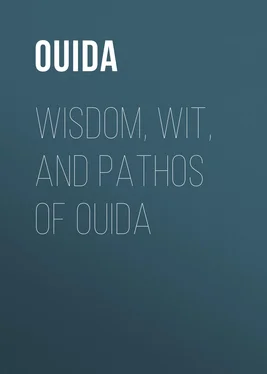Ouida - Wisdom, Wit, and Pathos of Ouida
Здесь есть возможность читать онлайн «Ouida - Wisdom, Wit, and Pathos of Ouida» — ознакомительный отрывок электронной книги совершенно бесплатно, а после прочтения отрывка купить полную версию. В некоторых случаях можно слушать аудио, скачать через торрент в формате fb2 и присутствует краткое содержание. Жанр: foreign_prose, literature_19, foreign_antique, на английском языке. Описание произведения, (предисловие) а так же отзывы посетителей доступны на портале библиотеки ЛибКат.
- Название:Wisdom, Wit, and Pathos of Ouida
- Автор:
- Жанр:
- Год:неизвестен
- ISBN:нет данных
- Рейтинг книги:4 / 5. Голосов: 1
-
Избранное:Добавить в избранное
- Отзывы:
-
Ваша оценка:
- 80
- 1
- 2
- 3
- 4
- 5
Wisdom, Wit, and Pathos of Ouida: краткое содержание, описание и аннотация
Предлагаем к чтению аннотацию, описание, краткое содержание или предисловие (зависит от того, что написал сам автор книги «Wisdom, Wit, and Pathos of Ouida»). Если вы не нашли необходимую информацию о книге — напишите в комментариях, мы постараемся отыскать её.
Wisdom, Wit, and Pathos of Ouida — читать онлайн ознакомительный отрывок
Ниже представлен текст книги, разбитый по страницам. Система сохранения места последней прочитанной страницы, позволяет с удобством читать онлайн бесплатно книгу «Wisdom, Wit, and Pathos of Ouida», без необходимости каждый раз заново искать на чём Вы остановились. Поставьте закладку, и сможете в любой момент перейти на страницу, на которой закончили чтение.
Интервал:
Закладка:
He accepted the desolation of his life, for the sake of all beyond life, greater than life, which looked down on him from the silence of the night.
It was sunset in Venice,—that supreme moment when the magical flush of light transfigures all, and wanderers whose eyes have long ached with the greyness and the glare of northward cities gaze and think themselves in heaven. The still waters of the lagunes, the marbles and the porphyry and the jasper of the mighty palaces, the soft grey of the ruins all covered with clinging green and the glowing blossoms of creepers, the hidden antique nooks where some woman's head leaned out of an arched casement, like a dream of the Dandolo time when the Adriatic swarmed with the returning galleys laden with Byzantine spoil, the dim, mystic, majestic walls that towered above the gliding surface of the eternal water, once alive with flowers, and music, and the gleam of golden tresses, and the laughter of careless revellers in the Venice of Goldoni, in the Venice of the Past;—everywhere the sunset glowed with the marvel of its colour, with the wonder of its warmth.
Then a moment, and it was gone. Night fell with the hushed shadowy stillness that belongs to Venice alone; and in the place of the riot and luxuriance of colour there was the tremulous darkness of the young night, with the beat of an oar on the water, the scent of unclosing carnation-buds, the white gleam of moonlight, and the odour of lilies-of-the-valley blossoming in the dark archway of some mosaic-lined window.
The ruin that had stripped him of all else taught him to fathom the depths of his own attainments. He had in him the gifts of a Goethe; but it was only under adversity that these reached their stature and bore their fruit.
The words were true. The bread of bitterness is the food on which men grow to their fullest stature; the waters of bitterness are the debatable ford through which they reach the shores of wisdom; the ashes boldly grasped and eaten without faltering are the price that must be paid for the golden fruit of knowledge. The swimmer cannot tell his strength till he has gone through the wild force of opposing waves; the great man cannot tell the might of his hand and the power of his resistance till he has wrestled with the angel of adversity, and held it close till it has blessed him.
The artist was true to his genius; he knew it a greater gift than happiness; and as his hands wandered by instinct over the familiar notes, the power of his kingdom came to him, the passion of his mistress was on him, and the grandeur of the melody swelled out to mingle with the night, divine as consolation, supreme as victory.
The man who puts chains on another's limbs is only one shade worse than he who puts fetters on another's free thoughts and on another's free conscience.
One fetter of tradition loosened, one web of superstition broken, one ray of light let in on darkness, one principle of liberty secured, are worth the living for, he mused. Fame!—it is the flower of a day, that dies when the next sun rises. But to do something, however little, to free men from their chains, to aid something, however faintly, the rights of reason and of truth, to be unvanquished through all and against all, these may bring one nearer the pure ambitions of youth.
Happiness dies as age comes to us; it sets for ever, with the suns of early years: yet perhaps we may keep a higher thing beside which it holds but a brief loyalty, if to ourselves we can rest true, if for the liberty of the world we can do anything.
Do not believe that happiness makes us selfish; it is a treason to the sweetest gift of life. It is when it has deserted us that it grows hard to keep all the better things in us from dying in the blight.
"Coleridge cried, 'O God, how glorious it is to live!' Renan asks, 'O God, when will it be worth while to live?' In nature we echo the poet; in the world we echo the thinker."
"Yet you are greater than you were then," he said, slowly. "I know it,—I who am but a wine-cup rioter and love nothing but my summer-day fooling. You are greater; but the harvest you sow will only be reaped over your grave."
"I should be content could I believe it would be reaped then."
"Be content then. You may be so."
"God knows! Do you not think Marsy and Delisle de Sales and Linguet believed, as they suffered in their dungeons for mere truth of speech, that the remembrance of future generations would solace them? Bichât gave himself to premature death for science' sake; does the world once in a year speak his name? Yet how near those men are to us, to be forgotten! A century, and history will scarce chronicle them."
"Then why give the wealth of your intellect to men?"
"Are there not higher things than present reward and the mere talk of tongues? The monstrari digito were scarce a lofty goal. We may love Truth and strive to serve her, disregarding what she brings us. Those who need a bribe from her are not her true believers."
Philippe d'Orvâle tossed his silvery hair from his eyes,—eyes of such sunny lustre still.
"Ay! And those who held that sublime code of yours, that cleaving to truth for truth's sake, where are they? How have they fared in every climate and in every age? Stoned, crucified, burned, fettered, broken on the vast black granite mass of the blind multitude's brutality, of the priesthood's curse and craft!"
"True! Yet if through us, ever so slightly, the bondage of the creeds' traditions be loosened from the lives they stifle, and those multitudes—so weary, so feverish, so much more to be pitied than condemned—become less blind, less brute, the sacrifice is not in vain."
"In your sense, no. But the world reels back again into darkness as soon as a hand has lifted it for a while into light. Men hold themselves purified, civilised; a year of war,—and lust and bloodthirst rage untamed in all their barbarism; a taste of slaughter,—and they are wolves again! There was truth in the old feudal saying, 'Oignez vilain, il vous poindra; poignez vilain, il vous oindra.' Beat the multitudes you talk of with a despot's sword, and they will lick your feet; touch them with a Christ-like pity, and they will nail you to the cross."
There was terrible truth in the words: this man of princely blood, who disdained all sceptres and wanted nothing of the world, could look through and through it with his bold sunlit eyes, and see its rottenness to the core.
Chandos sighed as he heard.
"You are right,—only too right. Yet even while they crouch to the tyrant's sabre, how bitterly they need release! even while they crucify their teachers and their saviours, how little they know what they do! They may forsake themselves; but they should not be forsaken."
Philippe d'Orvâle looked on him with a light soft as woman's tears in his eyes, and dashed his hand down on the alabaster.
"Chandos, you live twenty centuries too late. You would have been crowned in Athens, and throned in Asia. But here, as a saving grace, they will call you—'mad!'"
"Well, if they do? The title has its honours. It was hooted against Solon and Socrates."
"I would do all in the world to please you , monseigneur," he answered, sadly; "but I cannot change my nature. The little aziola loves the shade, and shrinks from noise and glare and all the ways of men; I am like it. You cannot make the aziola a bird for sunlight; you cannot make me as others are."
Chandos looked down on him with an almost tender compassion. To him, whose years were so rich in every pleasure and every delight that men can enjoy, the loneliness and pain of Lulli's life, divorced from all the living world, made it a marvel profoundly melancholy, profoundly formed to claim the utmost gentleness and sympathy.
"I would not have you as others are, Lulli," he said, softly. "If in all the selfishness and pleasures of our world there were not some here and there to give their lives to high thoughts and to unselfish things, as you give yours, we should soon, I fear, forget that such existed. But for such recluse's devotion to an art as yours, the classics would have perished; without the cloister-penmen, the laws of science would never have broken the bondage of tradition."
Читать дальшеИнтервал:
Закладка:
Похожие книги на «Wisdom, Wit, and Pathos of Ouida»
Представляем Вашему вниманию похожие книги на «Wisdom, Wit, and Pathos of Ouida» списком для выбора. Мы отобрали схожую по названию и смыслу литературу в надежде предоставить читателям больше вариантов отыскать новые, интересные, ещё непрочитанные произведения.
Обсуждение, отзывы о книге «Wisdom, Wit, and Pathos of Ouida» и просто собственные мнения читателей. Оставьте ваши комментарии, напишите, что Вы думаете о произведении, его смысле или главных героях. Укажите что конкретно понравилось, а что нет, и почему Вы так считаете.












